A Research Report on Moral Foundation Theory
Added on 2023-06-07
21 Pages4375 Words326 Views
Running head: A RESEARCH REPORT ON MORAL FOUNDATION THEORY
A Research Report on Moral Foundation Theory
Name of the Student
Name of the University
Author note
A Research Report on Moral Foundation Theory
Name of the Student
Name of the University
Author note
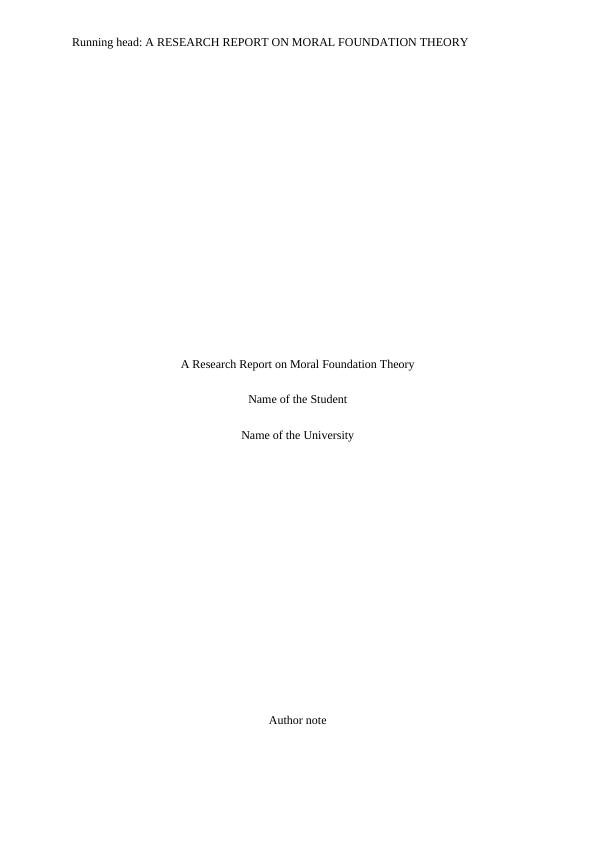
1A RESEARCH REPORT ON MORAL FOUNDATION THEORY
Abstract
The present report aims to find out the moral foundations as a function of political
orientation. To fulfil this purpose, a research sample comprising of a demographic ranging
between 18 to 55 years is considered who belong from Australia. They are administered with
two separate questionnaires, one dealing with response for political orientation and the other
consisting of the Moral Foundation Questionnaire. The results were obtained as a
combination of two responses, one serving as a function of the other. The results were further
iterated graphically to establish rationality and clear evidence for those accounting for highest
responses. It was observed that individuals were inclined more towards the political
orientation of Strong Libertinism advocating social rights and justice while having a cynical
approach to the authoritarian values of Government.
Abstract
The present report aims to find out the moral foundations as a function of political
orientation. To fulfil this purpose, a research sample comprising of a demographic ranging
between 18 to 55 years is considered who belong from Australia. They are administered with
two separate questionnaires, one dealing with response for political orientation and the other
consisting of the Moral Foundation Questionnaire. The results were obtained as a
combination of two responses, one serving as a function of the other. The results were further
iterated graphically to establish rationality and clear evidence for those accounting for highest
responses. It was observed that individuals were inclined more towards the political
orientation of Strong Libertinism advocating social rights and justice while having a cynical
approach to the authoritarian values of Government.
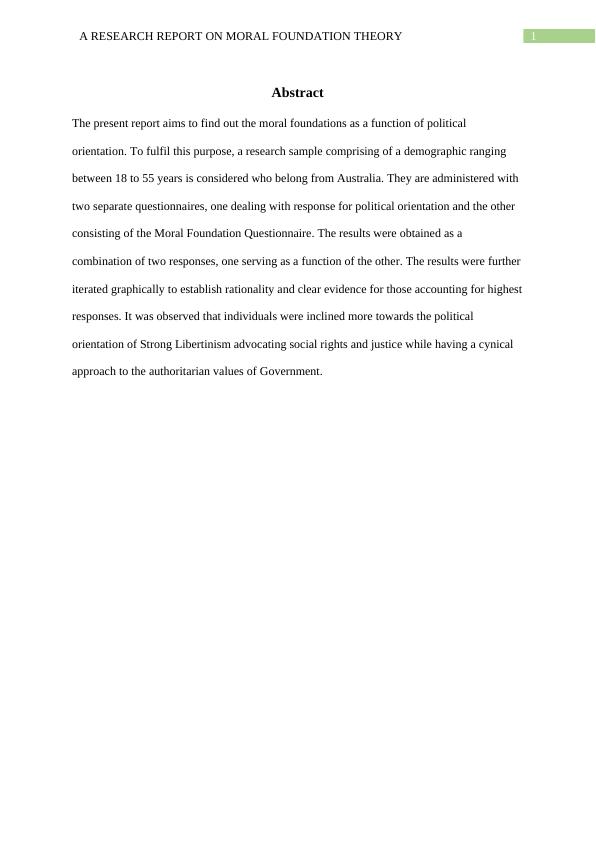
2A RESEARCH REPORT ON MORAL FOUNDATION THEORY
Introduction
Moral foundations play an extensive role in constructing the Liberal or Conservative
political orientations. According to the studies conducted (Graham, Haidt & Nosek, 2009),
the researcher constructed altered model to measure the moral systems. The authors
performed four studies using various approaches, presenting the facts that liberals
consistently shows greater endorsement towards the moral foundations of Fairness and Care.
Conservatives form their moral attributes based entirely on the following moral foundations
of Harm/care, Fairness/reciprocity, In group/loyalty, Authority/respect, and Purity/sanctity.
The authors (Graham, Haidt & Nosek, 2009) examined the connection concerning
political emphasis and moral foundations. In Australia, we have a general understanding of
the concepts of 'liberal' and 'conservative'. The authors also had a moderate consideration of
exactly how they were having a variance between the moral foundations. Four studies using
multiple approaches were utilised, foundations of In group/ loyalty, Authority/respect and
Purity/sanctity liberals constantly showed larger support for Harm/Care and
Fairness/reciprocity. In the first study variance was noticed in conceptual evaluations of the
significance of foundation of morality that concerned violence or loyalty. The second study
was based around the moral judgements of recorded statements and circumstances. The third
study related to purity responses to offensive/forbidden trade-offs. The last research study
examined the usage of foundation-associated verses in the moral text of spiritual readings.
The research was piloted by Day, Fiske, Downing & Trail (2014) to examine if MFT
has any effect on political outlooks of both political liberals and conservatives. The
researchers exhibited the attitudes of both Liberals and Conservatives can be affected, when
exposed to moral grounds that are significant to the relevant addresses. A research was
performed by researchers Day, Fiske, Downing & Trail (2014) to understand the cultural and
Introduction
Moral foundations play an extensive role in constructing the Liberal or Conservative
political orientations. According to the studies conducted (Graham, Haidt & Nosek, 2009),
the researcher constructed altered model to measure the moral systems. The authors
performed four studies using various approaches, presenting the facts that liberals
consistently shows greater endorsement towards the moral foundations of Fairness and Care.
Conservatives form their moral attributes based entirely on the following moral foundations
of Harm/care, Fairness/reciprocity, In group/loyalty, Authority/respect, and Purity/sanctity.
The authors (Graham, Haidt & Nosek, 2009) examined the connection concerning
political emphasis and moral foundations. In Australia, we have a general understanding of
the concepts of 'liberal' and 'conservative'. The authors also had a moderate consideration of
exactly how they were having a variance between the moral foundations. Four studies using
multiple approaches were utilised, foundations of In group/ loyalty, Authority/respect and
Purity/sanctity liberals constantly showed larger support for Harm/Care and
Fairness/reciprocity. In the first study variance was noticed in conceptual evaluations of the
significance of foundation of morality that concerned violence or loyalty. The second study
was based around the moral judgements of recorded statements and circumstances. The third
study related to purity responses to offensive/forbidden trade-offs. The last research study
examined the usage of foundation-associated verses in the moral text of spiritual readings.
The research was piloted by Day, Fiske, Downing & Trail (2014) to examine if MFT
has any effect on political outlooks of both political liberals and conservatives. The
researchers exhibited the attitudes of both Liberals and Conservatives can be affected, when
exposed to moral grounds that are significant to the relevant addresses. A research was
performed by researchers Day, Fiske, Downing & Trail (2014) to understand the cultural and
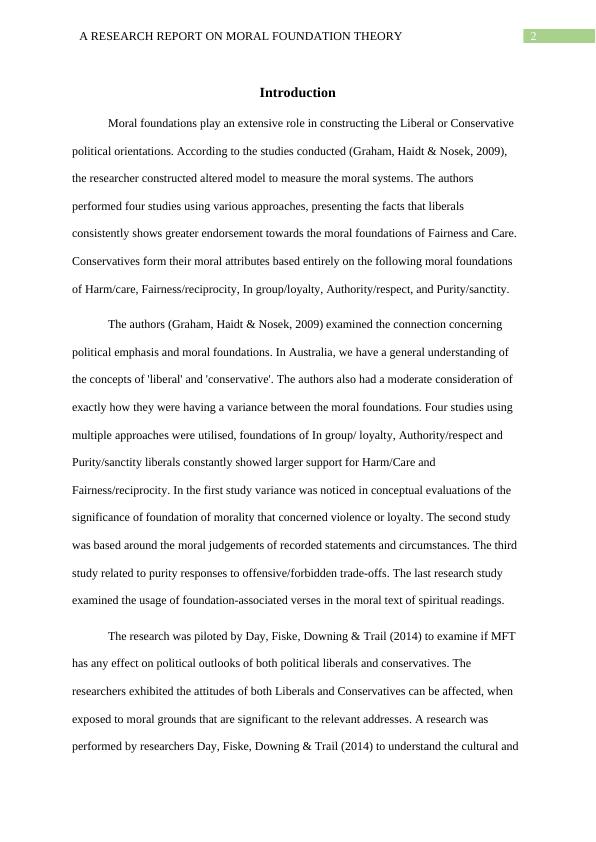
3A RESEARCH REPORT ON MORAL FOUNDATION THEORY
political variations and how they are related to the theory of morality resulted in the Moral
Foundation Theory (MFT). The researchers instigated the research by examining the
historical data involving evolutionary psychology and anthropology, looking for connections
of how our moral evolution began and how we regulated our moral behaviours within
different cultural spectrum.
A theory developed by authors transformed the names of the foundations of Moral
foundations to the following: Care/harm: it’s associated to the sustained development as
humans with emotions as well as a capacity to sense the discomfort of other people.
Fairness/cheating: Self-sacrifice and unselfishness are directly related to this foundation. It
creates concepts of righteousness, integrity, fairness, and independence. Loyalty/betrayal: it is
linked to faithfulness and devotion as ancestral beings able to form variable alliance.
Authority/subversion: The foundation was moulded via the related extended primitive
records of classified community dealings. It motivates benefits of providing direction through
leading and following the command of the leader, incorporating respect to sincere authority
and respect for customs and traditions. Sanctity/degradation: Psychology of revulsion and
impurity re the major designers that shaped this foundation. It motivates spiritual beliefs that
inhabit a raised, excluded or minimised sensuous, moral way to reside in the society.
Researchers developed a questionnaire based on the five components of the MFT
(Graham et al., 2011). The three new findings about Morality emerged from their research
(a) Comparative model fitting of confirmatory factor analyses (b) convergent/discriminant
validity; and (c) establish pragmatic validity. The research study justifies that liberal morality
prioritise Harm and Fairness over the other three foundations of morality.
Lorr & Zea, (1977) aimed to evaluate the hypothesis to measure a liberal-conservative
attitude. It was then examined by the Survey of Ethical Attitudes, 81 men and women were
political variations and how they are related to the theory of morality resulted in the Moral
Foundation Theory (MFT). The researchers instigated the research by examining the
historical data involving evolutionary psychology and anthropology, looking for connections
of how our moral evolution began and how we regulated our moral behaviours within
different cultural spectrum.
A theory developed by authors transformed the names of the foundations of Moral
foundations to the following: Care/harm: it’s associated to the sustained development as
humans with emotions as well as a capacity to sense the discomfort of other people.
Fairness/cheating: Self-sacrifice and unselfishness are directly related to this foundation. It
creates concepts of righteousness, integrity, fairness, and independence. Loyalty/betrayal: it is
linked to faithfulness and devotion as ancestral beings able to form variable alliance.
Authority/subversion: The foundation was moulded via the related extended primitive
records of classified community dealings. It motivates benefits of providing direction through
leading and following the command of the leader, incorporating respect to sincere authority
and respect for customs and traditions. Sanctity/degradation: Psychology of revulsion and
impurity re the major designers that shaped this foundation. It motivates spiritual beliefs that
inhabit a raised, excluded or minimised sensuous, moral way to reside in the society.
Researchers developed a questionnaire based on the five components of the MFT
(Graham et al., 2011). The three new findings about Morality emerged from their research
(a) Comparative model fitting of confirmatory factor analyses (b) convergent/discriminant
validity; and (c) establish pragmatic validity. The research study justifies that liberal morality
prioritise Harm and Fairness over the other three foundations of morality.
Lorr & Zea, (1977) aimed to evaluate the hypothesis to measure a liberal-conservative
attitude. It was then examined by the Survey of Ethical Attitudes, 81 men and women were
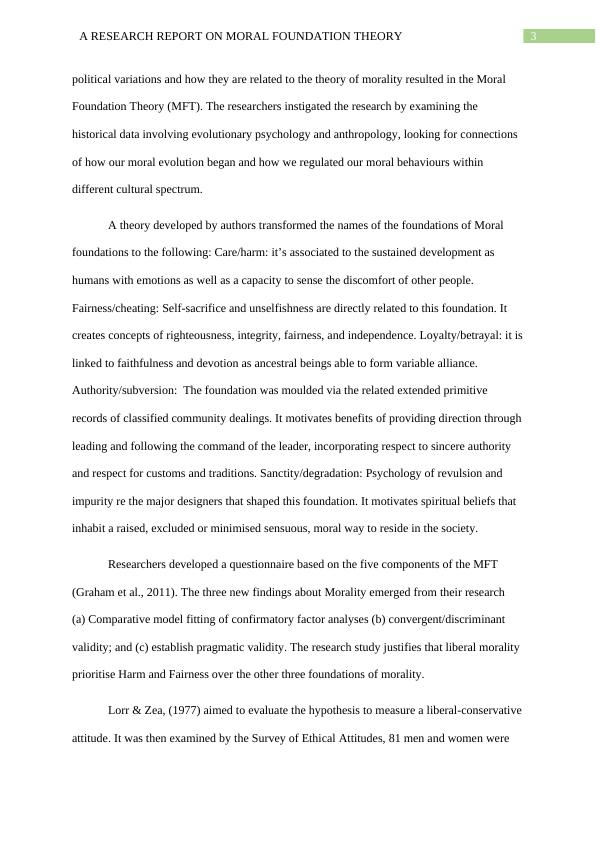
4A RESEARCH REPORT ON MORAL FOUNDATION THEORY
sampled and managed for the study that evaluated social attitude, intransigence, and open-
mindedness. Participants who scored high on the survey, set for social responsibility ethic,
were described as dependable, resistant to change, helpful and conventional. Participants who
scored low were classed as innovative, independent, unconventional, and rebellious. The
study validated and confirmed the hypothesis, that the moral judgement as gauged by the
Survey can be understood as a measure of liberal-conservative attitude.
It is hypothesised that Political liberals believe in equality, openness freedom and
their concept is constructed on the moral foundations of Fairness/reciprocity and Harm/care.
They do not rate al the Moral Foundations equally. Political Liberals have traditionally
engaged in an enthusiastic sight of human nature, also they have unconstrained views.
According to Liberal views people should be free, should have openness to experiences
including diversity, variety and new ideas.
Conventionally, conservatives take a distrustful sight of human character, deeming
that humans are fundamentally self-centred (Frimer, Biesanz, Walker & MacKinlay, 2013).
Therefore they have constrained visualisation of others. Due to this fact, the conservatives
believe that humans need to have constrains of authority, traditions and customs to live by in
a society.
It is hypothesised that Political conservative people are traditionally believers of the
Moral Foundation Theory aspects including Fairness/reciprocity, Harm/Care, Purity/sanctity,
Authority/respect, and In group/loyalty. Political conservatives are normally inclined towards
more safety and dependability. They have right wing views and are mostly closed
individuals.
Method
In the course of human evolution, it was observed that human being are typically
sensitive to a number of issues that pertain to either treating other individuals properly or
sampled and managed for the study that evaluated social attitude, intransigence, and open-
mindedness. Participants who scored high on the survey, set for social responsibility ethic,
were described as dependable, resistant to change, helpful and conventional. Participants who
scored low were classed as innovative, independent, unconventional, and rebellious. The
study validated and confirmed the hypothesis, that the moral judgement as gauged by the
Survey can be understood as a measure of liberal-conservative attitude.
It is hypothesised that Political liberals believe in equality, openness freedom and
their concept is constructed on the moral foundations of Fairness/reciprocity and Harm/care.
They do not rate al the Moral Foundations equally. Political Liberals have traditionally
engaged in an enthusiastic sight of human nature, also they have unconstrained views.
According to Liberal views people should be free, should have openness to experiences
including diversity, variety and new ideas.
Conventionally, conservatives take a distrustful sight of human character, deeming
that humans are fundamentally self-centred (Frimer, Biesanz, Walker & MacKinlay, 2013).
Therefore they have constrained visualisation of others. Due to this fact, the conservatives
believe that humans need to have constrains of authority, traditions and customs to live by in
a society.
It is hypothesised that Political conservative people are traditionally believers of the
Moral Foundation Theory aspects including Fairness/reciprocity, Harm/Care, Purity/sanctity,
Authority/respect, and In group/loyalty. Political conservatives are normally inclined towards
more safety and dependability. They have right wing views and are mostly closed
individuals.
Method
In the course of human evolution, it was observed that human being are typically
sensitive to a number of issues that pertain to either treating other individuals properly or
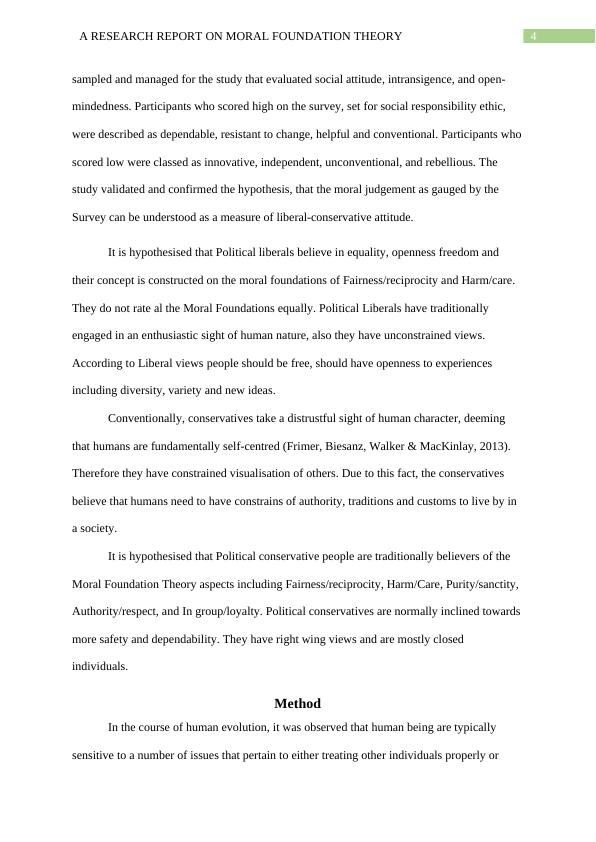
5A RESEARCH REPORT ON MORAL FOUNDATION THEORY
being a well-mannered and adequately supportive individual oneself adhering to certain
social norms and traditions. The former aspect relates to the first two foundations and the
latter aspect relates to the last three foundations of in the Moral Foundation Theory. The aim
of the present study is to measure the extent of political affiliation of a sample population
based on the five psychological foundations of morality. The research is carried out by
administering the Single-Item Political Orientation Question along with the Moral
Foundations Questionnaire which was propounded in 2009 by Jesse Graham and Jonathan
Haidt (Graham, Haidt & Nosek, 2009).
The Single Item Political Orientation Questionnaire consists of the following
interrogatory element for investigation on a seven-point scale:
In terms of political inclination, individuals often consider themselves to be either
belonging to the category of liberals or Conservatives.
On such a scale, where do you want to place yourself?
1. Strongly Liberal
2. Moderately Liberal
3. Slightly Liberal
4. Neutral (Moderate)
5. Slightly Conservative
6. Moderately Conservative
7. Strongly Conservative
The Moral Foundation Questionnaire consists of two separate parts. The present research
has relevance with only Part 1 which poses the following investigative query:
being a well-mannered and adequately supportive individual oneself adhering to certain
social norms and traditions. The former aspect relates to the first two foundations and the
latter aspect relates to the last three foundations of in the Moral Foundation Theory. The aim
of the present study is to measure the extent of political affiliation of a sample population
based on the five psychological foundations of morality. The research is carried out by
administering the Single-Item Political Orientation Question along with the Moral
Foundations Questionnaire which was propounded in 2009 by Jesse Graham and Jonathan
Haidt (Graham, Haidt & Nosek, 2009).
The Single Item Political Orientation Questionnaire consists of the following
interrogatory element for investigation on a seven-point scale:
In terms of political inclination, individuals often consider themselves to be either
belonging to the category of liberals or Conservatives.
On such a scale, where do you want to place yourself?
1. Strongly Liberal
2. Moderately Liberal
3. Slightly Liberal
4. Neutral (Moderate)
5. Slightly Conservative
6. Moderately Conservative
7. Strongly Conservative
The Moral Foundation Questionnaire consists of two separate parts. The present research
has relevance with only Part 1 which poses the following investigative query:
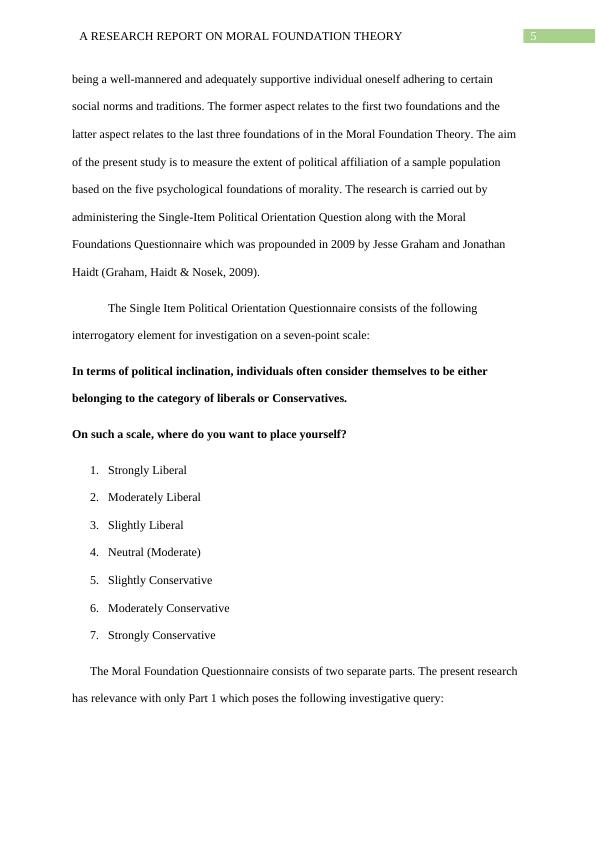
End of preview
Want to access all the pages? Upload your documents or become a member.
Related Documents
Relationship between Moral Foundations and Political Orientation in Australialg...
|16
|4042
|475
Political Orientation Characterizes Essaylg...
|20
|3979
|58
COM318 | MORAL FOUNDATIONS THEORY.lg...
|6
|1456
|27
Moral Foundations and Political Attitudes : Doclg...
|6
|1290
|49
Moral Foundation Theory and Its Importancelg...
|6
|1288
|394
Political Orientation and Moral Foundations: A Study on Psychologylg...
|12
|2753
|255
